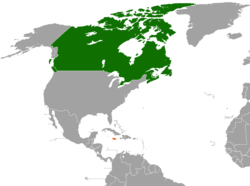 | |
Canada | Jamaica |
|---|---|
Canada and Jamaica established diplomatic relations in 1962. Both countries are full members of the Organization of American States [1] and of the Commonwealth of Nations. [2]
Contents
- Agreements
- Resident diplomatic missions
- High level visits
- Diaspora
- See also
- External links
- References
Jamaican-Canadians celebrate their island heritage through festivals held in major cities across Canada, the most recognized of which is Caribana. Caribana is held in Toronto, Ontario every year and attracts over one million visitors to the region, many of whom fly all the way from Jamaica.
